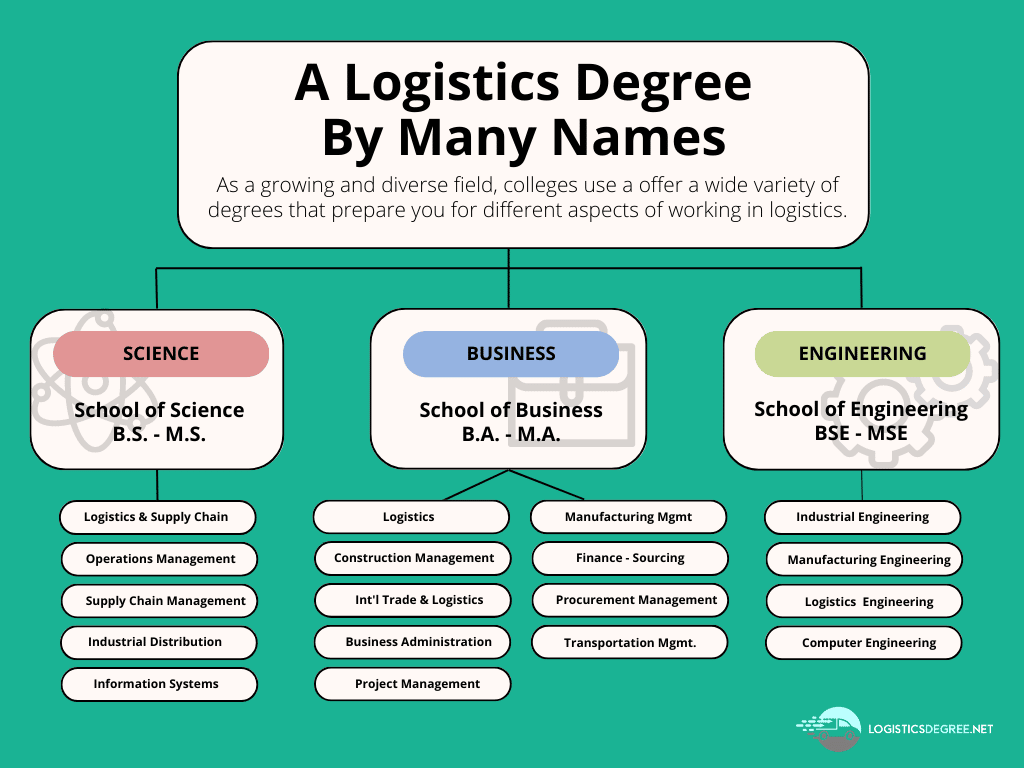
Real Logistics Professionals. Honest Answers.
More Answers From Logistics Professionals
4 Steps to Getting a Career in Logistics
Step 1
Pre-Requisites
High school diploma or GED.
Step 2
Earn a Degree
Earn a Bachelors or Masters in Logistics or related degree.
Step 3
Certification
Obtain optional certification through the ASCM or SOLE.
Step 4
Seek employment
Salary range, $58,940 – $164,590 (BLS 2020).
Best Online Logistics Degree Programs
A bachelor’s degree is standard for working in logistics, while a master’s degree may offer advantages, such as a higher salary to more promotion opportunities. Logistics degree programs are also called: supply chain management, operations management, business process, procurement, logistics and project management degree programs.
The following colleges offer accredited logistics degree online programs.
Want More Options? See Our Complete Directory of Logistics Programs:
Online – Campus Bachelors – Campus Masters
What Our Experts Say About Online Logistics Programs
The advantage [of an online logistics degree program], you can do it on your own time. You can do the work and the curriculum is fantastic.

… if you’re working from home or after work, you can take your class, and then apply everything that you’re learning to your job in real time. So I think that’s a huge advantage to having that online class option.

It gave me a lot more flexibility to find time, not necessarily for myself, but also to be productive in other ways and maybe even dive into some of the material a little bit more and use it at work.

School Selection Considerations
Accelerated vs. Traditional Programs
A traditional bachelors in logistics requires full-time attendance for four years, something many students find difficult when trying to balance their education with their work and personal commitments. That’s why accelerated logistics degree programs have become an increasingly popular alternative.
An accelerated degree program offers the opportunity to earn a bachelors or masters degree in logistics in a shorter amount of time than a traditional program. For example, some accelerated bachelors in logistics programs can be completed in as little as 18 months. This timetable can be accomplished through a variety of methods, including compressed course schedules, year-round enrollment, and online or hybrid learning options. By allowing students to complete their education more quickly, accelerated programs offer numerous benefits. these include:
- Earn A Salary Sooner: One of the biggest advantages of an accelerated degree program is that it allows students to enter the workforce and start earning money sooner. This can be especially important for those with financial responsibilities or who need to start paying off student loans. By earning a degree more quickly, students can also move into higher-paying positions more quickly, increasing their earning potential over the course of their careers.
- Increased Flexibility: Another advantage of accelerated degree programs is that they are often more flexible, allowing students to study at their own pace and on their own schedule. For those with busy schedules or who live far from a traditional college campus, an accelerated program can be the ideal solution. By offering online or hybrid learning options, accelerated programs make it possible for students to balance their education with their other commitments.
- Cost Savings: Finally, accelerated degree programs are often more cost-effective than traditional programs. By compressing the time it takes to earn a degree, students can save on tuition, room and board, and other costs associated with attending college.
Online vs. Campus Programs
Online degree programs are a popular alternative to traditional campus-based programs, offering students the flexibility to earn their logistics degree from anywhere, at any time. But while online education has its advantages, it also comes with drawbacks.
Advantages of Online Logistics Degree Programs:
- Flexibility: Online programs offer students the flexibility to complete coursework at any time, from anywhere, making it easier to balance education with work and personal commitments.
- Convenience: Online programs often have a wider range of courses available, making it easier for students to find the courses they need to complete their degree.
- Cost: Online programs are often more cost-effective than traditional campus-based programs, as they do not require students to pay for housing, transportation, or other costs associated with attending college in person.
Disadvantages of Online Logistics Degree Programs:
- Lack of In-Person Interaction: Online programs can lack the in-person interaction and community that students get from attending a traditional campus-based program.
- Technical Difficulties: Online programs can be vulnerable to technical difficulties, such as internet connectivity issues, that can impact the ability of students to complete coursework and engage with instructors.
- Quality: While online programs can offer high-quality education, there is no guarantee that all online programs are equal in terms of quality, and students need to be careful when choosing an online program to ensure that it is reputable and accredited.
Accreditation Status
Accreditation indicates a degree program meets certain standards of quality, ensuring the education and training received is of a high level. Employers often prefer or require job applicants to have a degree from an accredited program, which increases job opportunities and earning potential for logisticians and others in the logistics field. Accreditation also provides assurance to students that their investment in education will be regarded as valuable. And finally, some financial aid may only be available through accredited degree programs.
Common Logistics Bachelor’s Degrees
Logistics is a rapidly growing industry with a wide range of career opportunities. Due to this, schools offer a wide array of degree options that can help you enter the field of logistics.
Bachelor’s Degrees in Logistics:
- Bachelor of Science in Logistics and Supply Chain Management: This degree program focuses on the management of goods and services from the point of origin to the point of consumption. Students learn about procurement, transportation, warehousing, and other key aspects of the supply chain.
- Bachelor of Business Administration in Logistics: This degree program combines business and logistics courses to provide students with a comprehensive understanding of the logistics industry. Students learn about business administration, finance, marketing, and other key business concepts, as well as logistics-specific topics such as transportation, inventory management, and supply chain optimization.
- Bachelor of Business Administration: This degree program provides students with a comprehensive understanding of business concepts, including finance, marketing, and management. While it may not be as focused on logistics specifically, students may be able to take elective courses in logistics and supply chain management to supplement their education.
- Bachelor of Science in Supply Chain Management: This degree program focuses on the management of goods and services from the point of origin to the point of consumption. Students learn about procurement, transportation, warehousing, and other key aspects of the supply chain. While similar to a degree in logistics, this program may have a more narrow focus on supply chain management, rather than the broader logistics field.
- Bachelor of Science in Industrial Engineering: This degree program focuses on the design and optimization of systems and processes. Students learn about operations research, quality control, and supply chain management, making it a good fit for those interested in logistics. However, this program may have a more technical focus, rather than a business-focused logistics degree.
Common Logistics Masters Degrees
Logistics is a rapidly growing industry with a wide range of career opportunities. Due to this, schools offer a wide array of degree options that can help you enter the field of logistics.
Master’s Degrees in Logistics:
- Master of Science in Logistics and Supply Chain Management: This advanced degree program is designed for students who want to specialize in the field of logistics and supply chain management. Students learn about complex logistics concepts, such as transportation planning, procurement, and operations research, and gain hands-on experience through case studies and real-world projects.
- Master of Business Administration in Logistics: This degree program combines business and logistics courses to provide students with a comprehensive understanding of the logistics industry. Students learn about business administration, finance, marketing, and other key business concepts, as well as logistics-specific topics such as transportation, inventory management, and supply chain optimization.
- Master of Business Administration (MBA): This advanced degree program combines business and management courses to provide students with a comprehensive understanding of the business world. Like the Bachelor of Business Administration, this program may not be as focused on logistics specifically, but students may be able to take elective courses in logistics and supply chain management to supplement their education.
- Master of Science in Supply Chain Management: This advanced degree program is designed for students who want to specialize in the field of supply chain management. Students learn about complex supply chain concepts, such as transportation planning, procurement, and operations research, and gain hands-on experience through case studies and real-world projects.
- Master of Science in Industrial Engineering: This advanced degree program is designed for students who want to specialize in industrial engineering, including topics such as operations research, quality control, and supply chain management.
Common Logistics Certificate Programs
Logistics is a rapidly growing industry with a wide range of career opportunities. Due to this, schools offer a wide array of degree options that can help you enter the field of logistics.
Certificate Degrees in Logistics:
- Certificate in Logistics and Supply Chain Management: This certificate program is designed for students who want to develop a foundational understanding of logistics and supply chain management. The program covers key topics such as procurement, transportation, warehousing, and inventory management.
- Certificate in Transportation and Logistics Management: This certificate program focuses specifically on transportation and logistics management, including topics such as transportation planning, fleet management, and transportation regulations.
Explore More
Resources
Learn More About Logistics and Supply Chain Management Careers, Salary, and Degree Options By Visiting These Valuable Resources:





